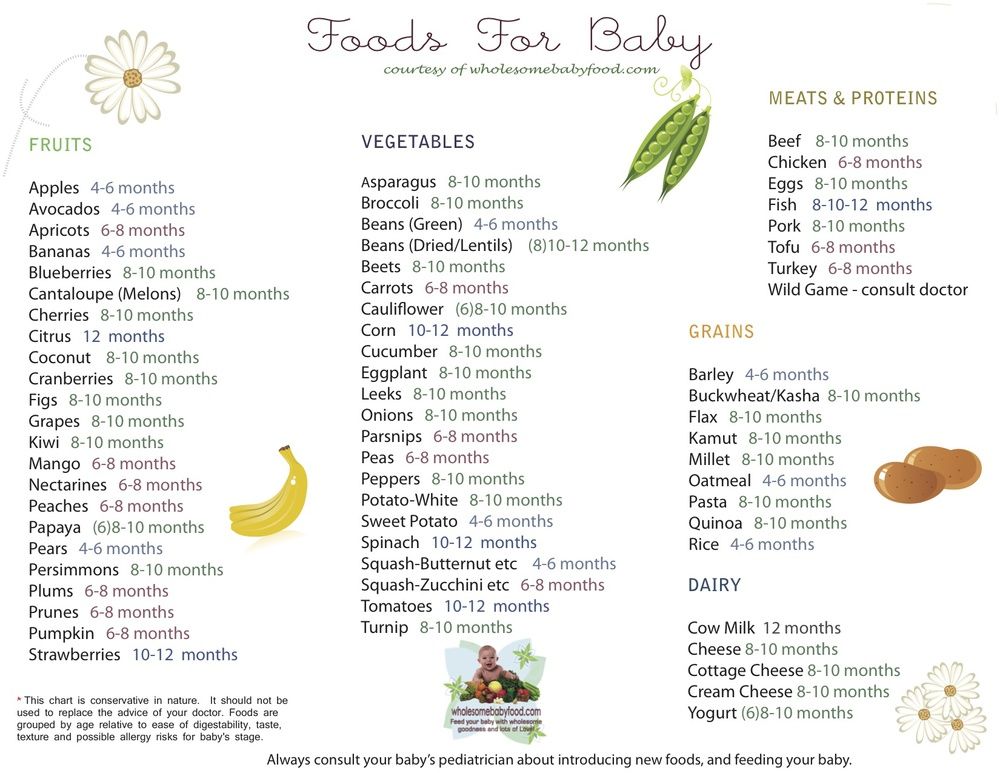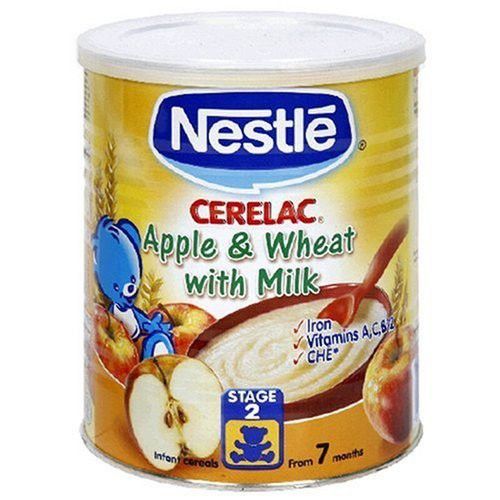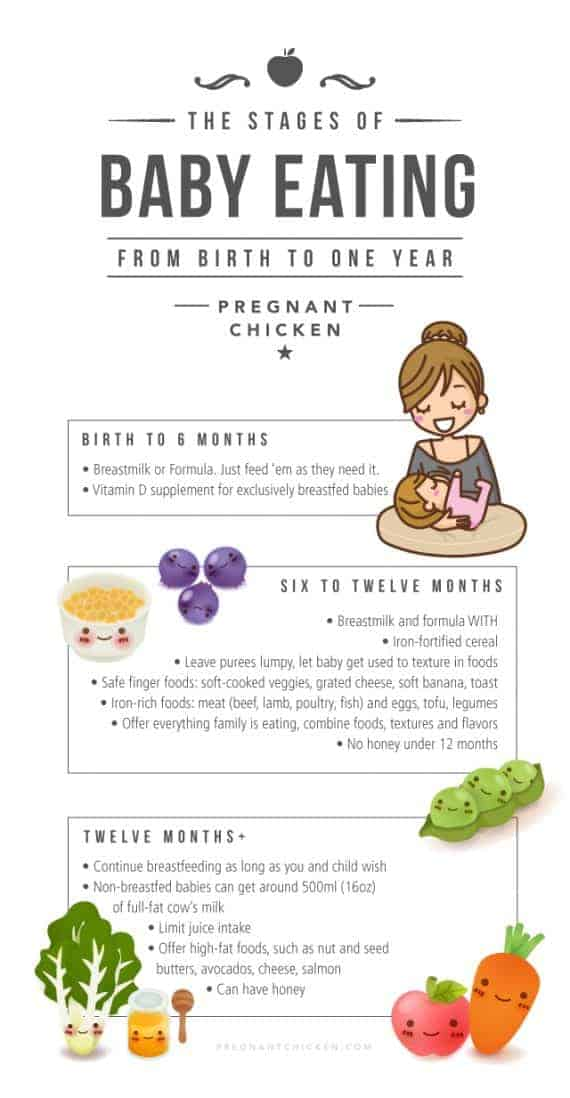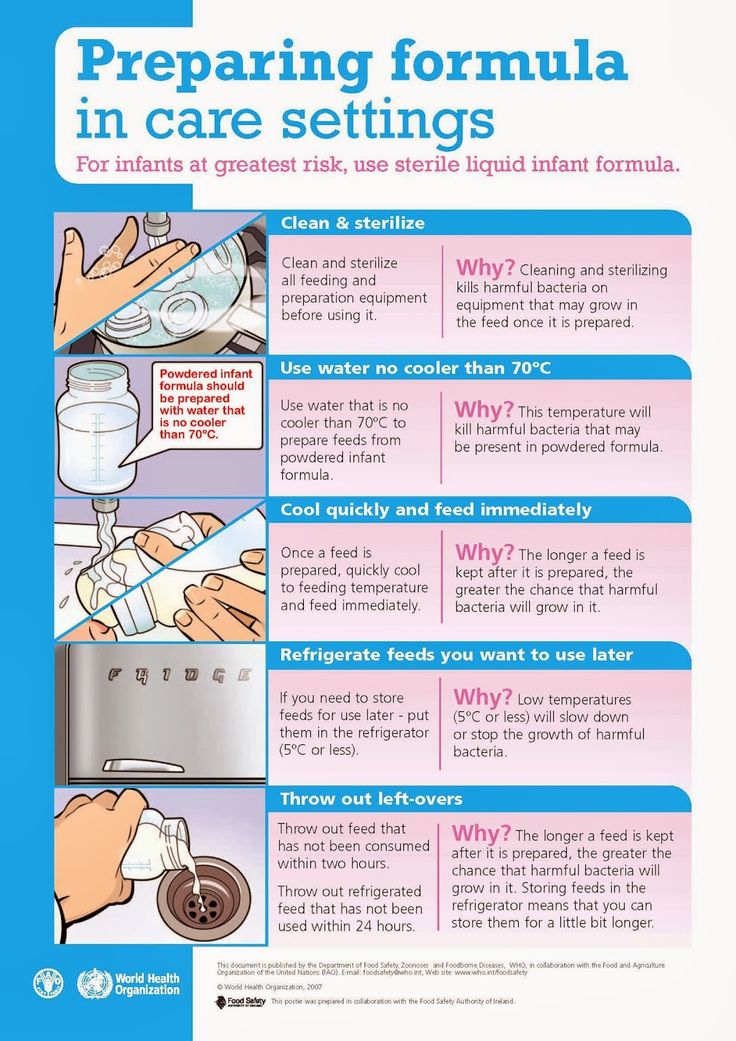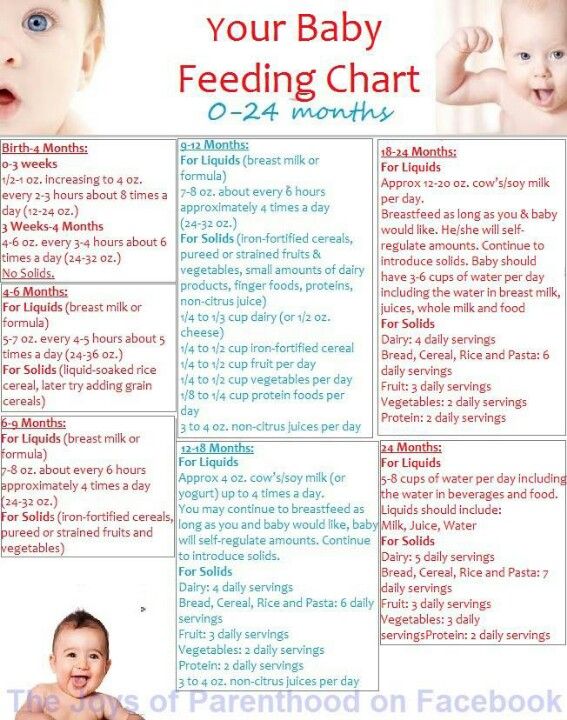Steamed eggplant baby food
Introducing Eggplant to Your Baby
Image: Shutterstock
Learn When your Baby Can Have Eggplant and How to Prepare Eggplant for Your Baby
Behold the purple wonder – as my kiddos have dubbed it. On this page you’ll learn about eggplant and try some yummy eggplant baby food recipe ideas too.
The Goodness of Eggplant aka Aubergine
While the eggplant is not a nutrient packed powerhouse, it does contain a great amount of Vitamin A and Folate. Eggplants contain fiber, a very important part of any diet as fiber helps maintain bowel regularity. Eggplant also contains a wonderful amount of calcium and even some Vitamin K.
Eggplant 1 cup (1″ cubes)
| VITAMINS:Vitamin A – 36.6 IUVitamin C – 1.3 mg Vitamin E – 0.4 mg Vitamin K – 2.9 mcg Niacin – .6 mg Folate – 13.9 mcg Thiamine – .1 mg Pantothenic Acid – . Vitamin B6 – .01 mg Choline – 9.3 mg Contains some other vitamins in small amounts | MINERALS:Potassium – 122 mgSodium – 237 mg Calcium – 5.9 mg Phosphorus – 14.8 mg Magnesium – 10.9 mg Iron – .2 mg Also contains small amounts of selenium, manganese, copper and zinc. |
When to introduce Eggplant to your baby
Eggplant is best given to an infant between 8-10 months old. If your baby has had any digestive issues, it would be best to introduce eggplant without the skins. You can offer pureed eggplant or steamed eggplant as a finger food. Eggplant is versatile and may be mixed with a variety of other foods
How to select and store eggplant for homemade baby food
According to the EWG, eggplant is not one of the “dirty dozen” foods that are most highly contaminated with pesticides – purchasing organic is a personal choice.
Eggplants should be firm and a bit heavy. Choose only those eggplants that have smooth and shiny skin. The color, no matter which color you purchase, should be very vivid. An eggplant that is discolored or has scars and bruises is not a good choice. These blemishes may indicate that the flesh inside the eggplant is damaged or even decaying.
Choose only those eggplants that have smooth and shiny skin. The color, no matter which color you purchase, should be very vivid. An eggplant that is discolored or has scars and bruises is not a good choice. These blemishes may indicate that the flesh inside the eggplant is damaged or even decaying.
Store eggplant carefully in the refrigerator; eggplants are a delicate vegetable. For longer storage, only cut the eggplant when you are ready to cook or otherwise use it.
The best way to safely prepare Eggplant for Baby Food
When cooking eggplant, you may either steam, fry/sautee, or bake it. Steaming it may be the best method if you plan on serving eggplant to your baby. Steamed eggplant tends to become very soft and tender (and sometimes mushy) so it makes a great finger food too.
Eggpalnt Baby Food Recipes Ideas
Eggplant- Basic Purée
Ingredients:
1 Eggplant
Directions:
Step 1: Wash and peel eggplant. Deseed as needed
Deseed as needed
Step 2: Cut into 1 inch pieces and steam until tender and mushy.
Step 3: OR slice eggplant in quarters and bake in a 375 degree oven for approx. 30 minutes or until tender.
Step 4: Place into your choice of appliance for pureeing and begin pureeing.
Step 5: Add water as necessary to achieve a smooth, thin consistency
Naked Eggplant & Cheese
Ingredients:
- 1 eggplant
- grated cheese – as desired
- olive oil
- basil (optional)
Directions:
Step 1: Preheat oven to 375 degrees F
Step 2: Slice eggplant in quarters, brush with olive oil and sprinkle with a small amount of basil. Bake for approx. 30 minutes or until tender.
Step 3: Sprinkle on grated cheese or take eggplant out of oven after 25 minutes and top slices with cheese, return to oven
Step 4: Chop or dice for finger food – may be mashed or pureed
Eggplant Sauté
Ingredients:
- 1 eggplant
- 2 tbsp olive oil
- 1/2 cup onions, finely chopped
- 1/2 teaspoon garlic powder
- 1/4 teaspoon pepper
- 1/4 teaspoon basil
Directions:
Step 1: Peel and dice eggplant
Step 2: Saute onions in olive oil over medium-low heat for 5 minutes.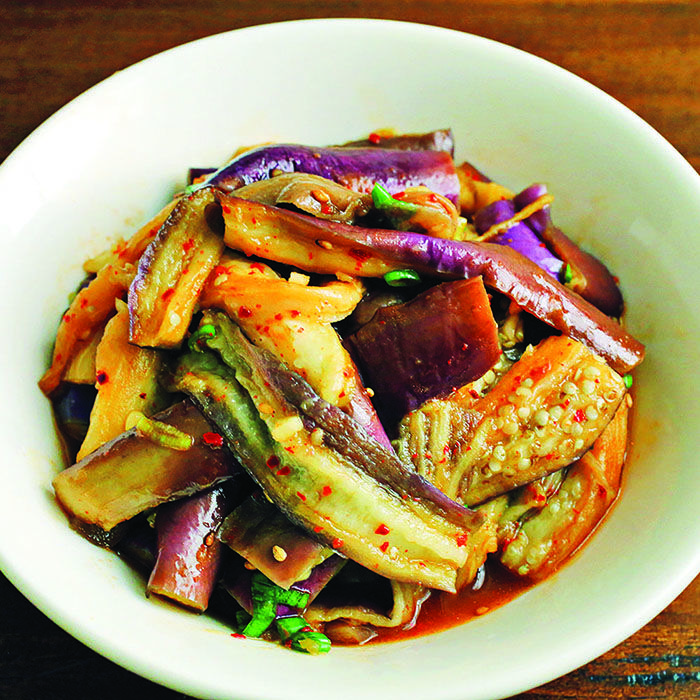
Step 3: Add spices
Step 4: Drain any remaining olive oil if desired
Step 5: Serve alone or over noodles
Foods Good to Mix With Eggplant:
- Green Beans
- Summer Squash – zucchini or yellow/crooked necked
- Carrots
- Cheese
- Brown Rice
- Lentils
- Pasta
Be warned that cooked eggplant looks rather ugly – it changes into a greyish color that may put you off but this is normal.
Remember, always consult with your pediatrician regarding introducing solid foods to your baby and specifically discuss any foods that may pose allergy risks for your baby.
This site complies with the HONcode standard for trustworthy health information: verify here.
SHARE ON FACEBOOK SHARE ON PINTEREST
10 Recipes And Health Benefits
Prepare tasty eggplant dishes to add variety and nutrients to babies’ weaning diet.
Research-backed
MomJunction believes in providing reliable, research-backed information to you.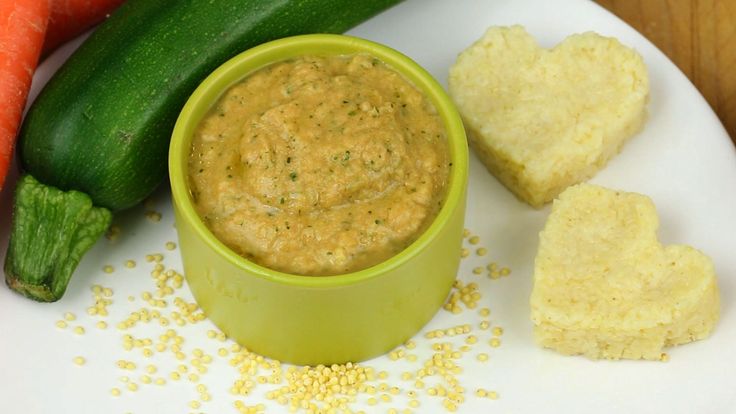 As per our strong editorial policy requirements, we base our health articles on references (citations) taken from authority sites, international journals, and research studies. However, if you find any incongruencies, feel free to write to us.
As per our strong editorial policy requirements, we base our health articles on references (citations) taken from authority sites, international journals, and research studies. However, if you find any incongruencies, feel free to write to us.
Image: Shutterstock
Eggplant, also known as aubergine, berenjena, or brinjal, is a nutritious food that comes in several varieties. Botanically a berry, this round and slender-shaped food with purple-black peel is mostly used as a vegetable. You can use eggplant for babies to make various delicacies to enhance their nutritional intake.
Including this bright and colorful food in your infant’s weaning diet can help them get more nutrients. Read on as we tell you more about the right age to feed eggplant to babies, its health benefits, and some delectable eggplant recipes that you may want to try.
When Can Babies Have Eggplant?
Infants can usually consume eggplant as soon as they are ready for solids, which is generally from the age of six to seven months (though each baby takes its own time).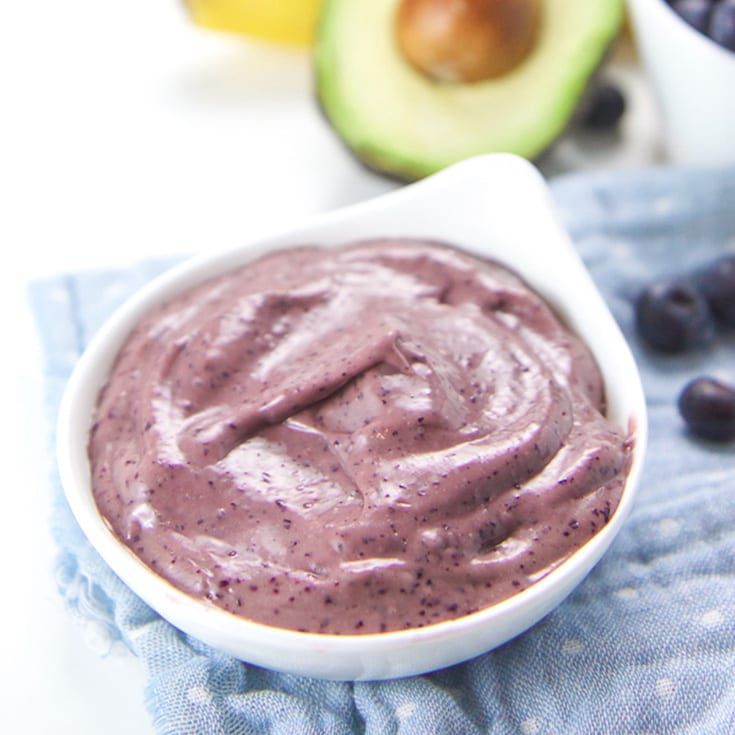 You can first introduce cooked, deseeded eggplant as a mash or a puree. Eggplant is versatile and can be mixed with a variety of foods. Once the baby is comfortable with the food, gradually introduce steamed, boiled, roasted, grilled, or baked eggplant slices as finger foods.
You can first introduce cooked, deseeded eggplant as a mash or a puree. Eggplant is versatile and can be mixed with a variety of foods. Once the baby is comfortable with the food, gradually introduce steamed, boiled, roasted, grilled, or baked eggplant slices as finger foods.
Avoid feeding raw eggplant to babies and toddlers since it contains compounds that can irritate the digestive system (1). Eggplant belongs to the same family as tomatoes and chili peppers. If these do not suit your baby, then do consult a doctor before introducing eggplant.
Related: 15 Foods You Should Avoid For Babies Younger Than A Year
Nutritional Value Of Eggplant
Eggplant can provide several vitamins, such as vitamin A and folate, minerals, a good amount of calcium, dietary fiber, and phytochemicals in considerable amounts. One cup (99 grams) of boiled eggplant prepared without salt can approximately provide the following nutrients (2) (3) (4) (5).
| Name | Amount | RDA (7-12 months) |
|---|---|---|
| Water | 88.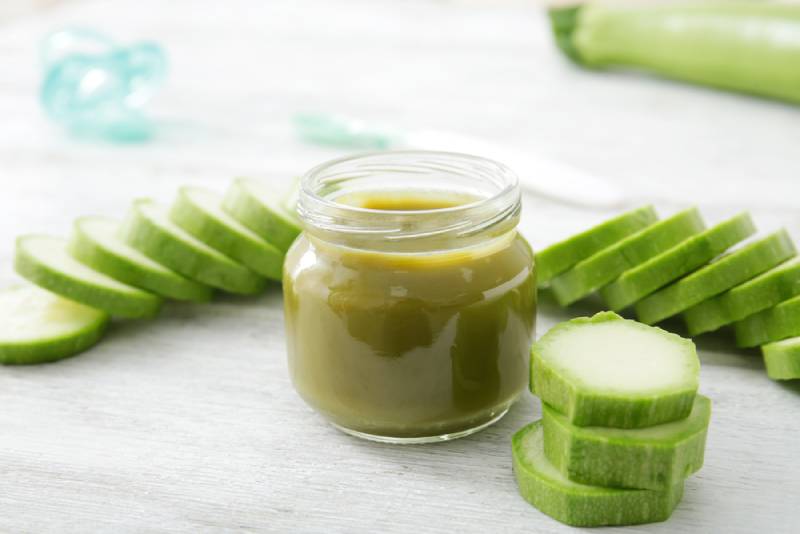 8g 8g | – |
| Energy | 34.6Kcal | – |
| Carbohydrate, by difference | 8.64g | – |
| Fiber, total dietary | 2.48g | – |
| Magnesium, Mg | 10.9mg | 60mg |
| Potassium, K | 122mg | 700mg |
| Zinc, Zn | 0.119mg | 5mg |
| Manganese, Mn | 0.112mg | 0.6mg(AI)* |
| Folate, total | 13.9µg | 80µg(AI) |
| Vitamin A, IU | 36.6IU | 375RE** |
| Vitamin K | 2.87µg | 10µg |
Sources: U.S. Department of Agriculture, World Health Organization, and Oregon State University
*AI = Adequate Intake
**RE = Retinol Equivalent
Possible Health Benefits Of Eggplant For Infants
Feeding eggplant with different types of foods in moderation can benefit your infant in the long run. Most of these benefits are due to the vitamins and bioactive compounds, like phenols, carotenoids, and alkaloids found in eggplant (6).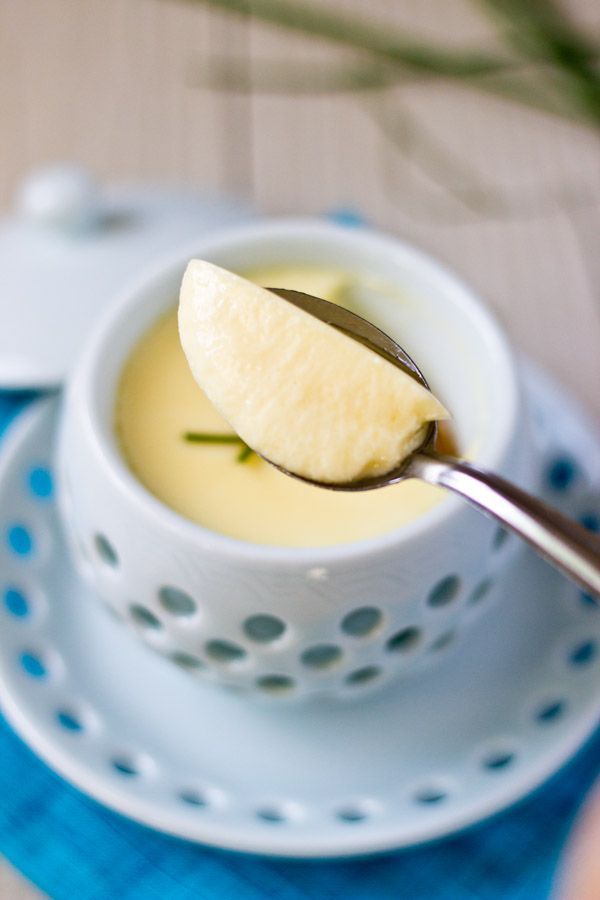
- Supplies several nutrients: One cup of cooked eggplant contains 2.48 grams of dietary fiber to facilitate smooth bowel movement. Besides, it offers notable amounts of dietary folate, thiamine, niacin, vitamins A, C and K, potassium, calcium, magnesium, and manganese to support the baby’s growth and development.
- Provides antioxidants and phytochemicals: Eggplant contains several antioxidants and phenolic compounds, like anthocyanins and flavonoids. Nasunin, an anthocyanin, from eggplant could protect the brain from oxidative damage (6) (7) (8). Phenolic compounds in eggplant, such as chlorogenic acid, could have anti-inflammatory and antimicrobial effects (9). All these help to improve heart health and phytonutrients increase brain function.
Eggplant has been in use in traditional medicine to treat several conditions, such as warts, burns, and inflammatory diseases, like stomatitis and gastritis (7).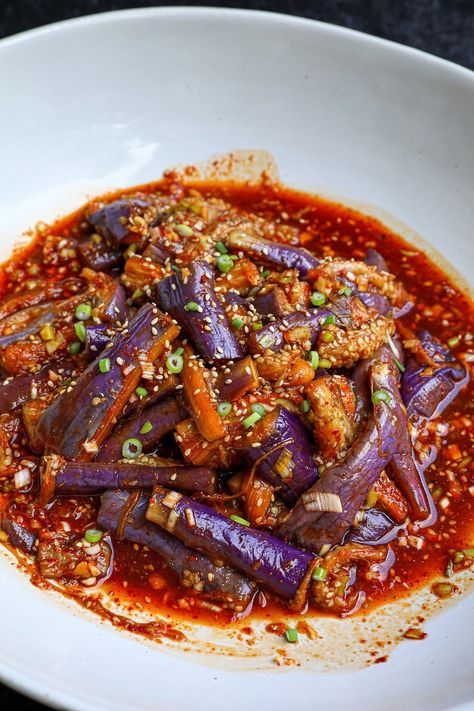
Related: Baby Development Month By Month
How To Select And Store Eggplant?
Selecting eggplants can be tricky as some of them are bitter or too seedy. Below are some simple steps to follow for selecting and storing eggplants (10).
Selection tips:
- Buy the eggplants that are firm and heavy, with a clean peel and vivid color.
- Check ripeness by lightly pressing the skin. If the skin does not spring back, it indicates overripening.
- Discard eggplants that look shriveled and have bruises, pits, and scars.
- Check for blemishes. An eggplant with too many blemishes indicates that it is possibly decaying.
- Select eggplants that have smooth and shiny skin
Quick tip
Pick small to medium-sized eggplants to prepare baby foods. It is because larger eggplants have more seeds and they may be bitter.
Related: What Causes Bruising In Infants And How To Treat?
Storage tips:
- Keep the eggplant in a paper bag or loosely wrap them in a paper towel and store in the refrigerator.
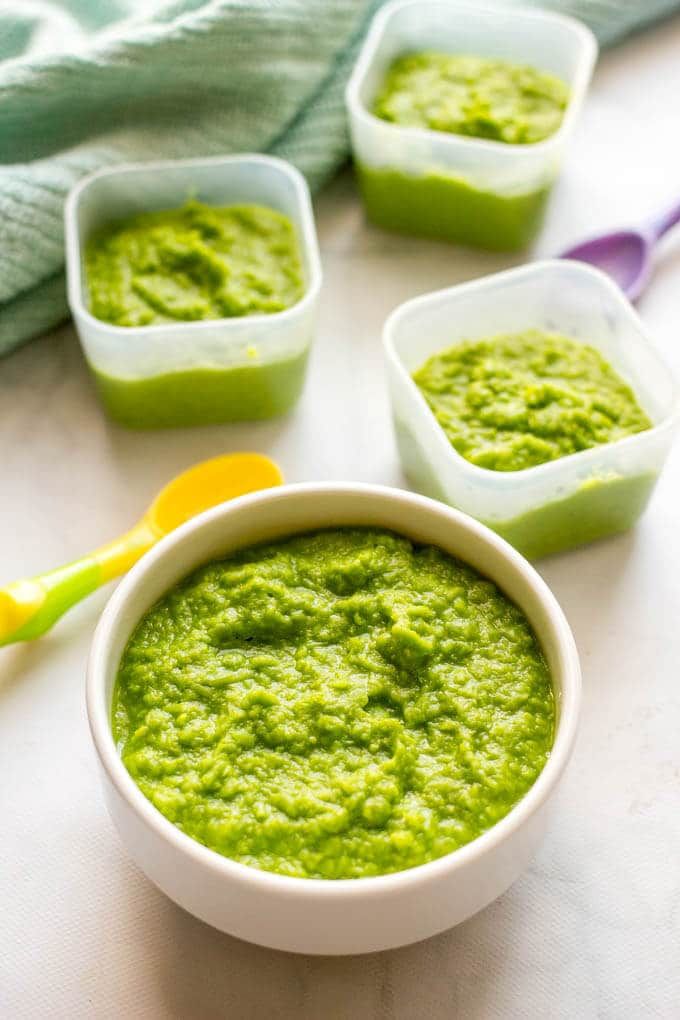 Putting them in a glass container is the best way to store them as they are a delicate vegetable.
Putting them in a glass container is the best way to store them as they are a delicate vegetable.
- Keep the refrigerator temperature between 10 and 12°C (50 and 54°F) to prevent the eggplants from spoiling.
- Place the crisper drawer away from fruits, like melons, banana, tomatoes, etc., as they produce ethylene gas that may cause the eggplant to over ripen.
- Try to use stored eggplants within three to seven days of purchase, and only cut when you are ready to cook or use it.
- You can store eggplants for up to eight months by blanching or steaming the peeled eggplant slices/cubes.
Precautions To Take While Feeding Eggplant To Babies And Toddlers
Take these precautions while feeding eggplant to your baby.
- Introduce eggplant in a pureed or mashed form prepared by steaming/boiling the peeled and deseeded eggplant. As your baby gets comfortable with the taste and digestibility, feed whole eggplant (with peel).
 If your baby has had digestive issues, it would be better to introduce it without the skin.
If your baby has had digestive issues, it would be better to introduce it without the skin.
- Begin by feeding a teaspoon in a meal and increase the intake gradually.
- If the baby looks uncomfortable after ingesting eggplant, discontinue feeding and try after some time.
- Check for signs of allergy, sensitivity, or intolerance. Eggplant allergy is rare but possible. Its symptoms may come up immediately after ingestion or hours after the intake (11).
Quick fact
Eggplants contain histamine that can mimic symptoms of an allergic reaction in a few babies. These reactions may be mistaken for eggplant allergy (13).
- If the baby has a family history of nightshade allergy (tomato, chili peppers, Cape gooseberry), birch pollen, or grass pollen allergy, then consult a doctor before introducing eggplant.
- For toddlers, give thinly sliced pieces of baked, steamed, baked, or grilled eggplant as finger foods to prevent choking.
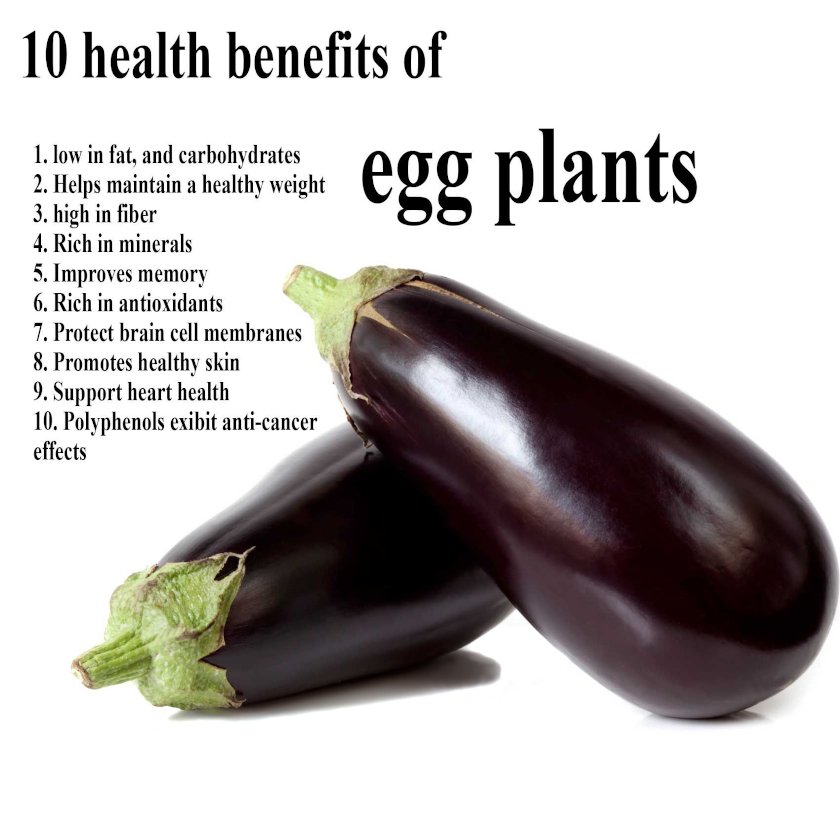
Quick tip
Remove the skin from eggplant pieces to minimize the choking risk in babies.
Related: 5 Types Of Skin Allergies In Babies, Treatment & Prevention
Tasty Eggplant Recipes For Babies and Toddlers
Below are some healthy and delightful eggplant recipes for babies above seven months of age. When cooked well, these recipes will help your baby’s taste buds to discover some new flavors.
1. Eggplant puree
Image: Shutterstock
You will need:
- 1 cup organic eggplant (peeled, deseeded, and chopped)
- 1/8 tsp cinnamon powder
How to:
- Steam the eggplant pieces until they turn soft and mushy and keep them aside to cool. Alternatively, you can cut the eggplant in half and bake.
- Blend the pieces into a smooth puree and ensure no lumps are left.
- Add cinnamon powder to the puree, mix well, and add water to achieve a thin and smooth consistency, if required.

2. Eggplant, plum, and pear puree
Image: Shutterstock
You will need:
- 1 cup eggplant (peeled and chopped)
- 2 plums (peeled, deseeded, and chopped)
- 1 pear (peeled, deseeded, and chopped)
How to:
- Steam the pear, plum, and eggplant in a steamer for about 15 minutes or until they turn soft.
- After steaming, set the fruits aside to cool.
- Blend the steamed fruits into a smooth puree. Ensure no lumps or chunks are left.
- Serve immediately with lightly toasted bread or add it to baby cereal.
Related: Apple Puree For Baby: Benefits, Recipes And Precautions
3. Eggplant and cheese
Image: Shutterstock
You will need:
- 1 cup eggplant pieces
- 2 tsp cheese (grated)
- 1 tsp dried basil flakes
- 1 tbsp virgin olive oil
How to:
- Preheat the oven to 190°C (375°F).
Line the baking tray with a baking paper.
- Cut the eggplant into thin slices and brush them with some olive oil and small amount of basil flakes.
- Place the slices on the baking tray and bake for 25-30 minutes or until tender.
- Take out the baking tray from the oven and sprinkle the cheese over the eggplant slices.
- Return the tray to the oven and bake for five to ten minutes.
- You may chop or dice for finger food and serve immediately with homemade tomato sauce for added flavor and taste.
- You can bake some other seasonal vegetables, like sweet potato and beans, along with eggplant slices to fill the dish with colors and flavors.
4. Eggplant sauté
Image: Shutterstock
You will need:
- 1 cup eggplant (thinly chopped)
- ½ cup of onion (chopped)
- ½tsp garlic powder
- ¼tsp basil powder
- ¼tsp pepper powder
- 2 tbsp olive oil
How to:
- Heat oil in a saucepan on medium heat and sauté onions for five minutes.

- Add peeled and diced eggplant, garlic powder, basil powder, and pepper powder into the saucepan, and cook until the eggplant becomes soft.
- Serve warm with rice, noodles or any other cereal or grain of your choice.
- Make this recipe colorful and healthier by adding different vegetables and roasted sesame seeds.
5. Roasted baby eggplant
Image: Shutterstock
You will need:
- 4 baby eggplants
- 2 garlic cloves (finely chopped)
- 1/4 cup oregano sprigs
- 1 tsp kosher salt
- ½tsp black pepper powder
- ¾ cup olive oil
- feta cheese (crumbled)
How to:
- Preheat the oven to 232°C (450°F).
- Slice the eggplants in half vertically (lengthwise).
- Line a baking tray with baking paper and place the eggplants on it with each piece at least a centimeter apart.

- Add oregano, salt, garlic slices, pepper powder, and olive oil in a small bowl and mix the ingredients well.
- Coat the eggplants with the mixture, cover the baking tray with a foil, and let the eggplants roast in the oven for 40 minutes.
- Once done, remove the foil and bake the eggplants for an additional five minutes.
- Place the eggplants on a serving plate, sprinkle feta cheese generously, and serve immediately.
- You can add lemon juice to the seasoning mix to make the recipe tangy.
6. Mildly spiced tomato and eggplant curry
Image: Shutterstock
You will need:
- 1 cup eggplant pieces (cut into 1/2-inch pieces)
- 1 onion (chopped)
- 2 cherry tomatoes (halved)
- 1 cup of chickpeas (cooked)
- 1/2 tsp kosher salt
- 1/2 tsp black pepper powder
- 1 tbsp olive oil
- 2 tsp curry powder
- ½ cup fresh basil
How to:
- Heat oil in a saucepan on low heat, add the onions and cook for about five minutes or until they soften.
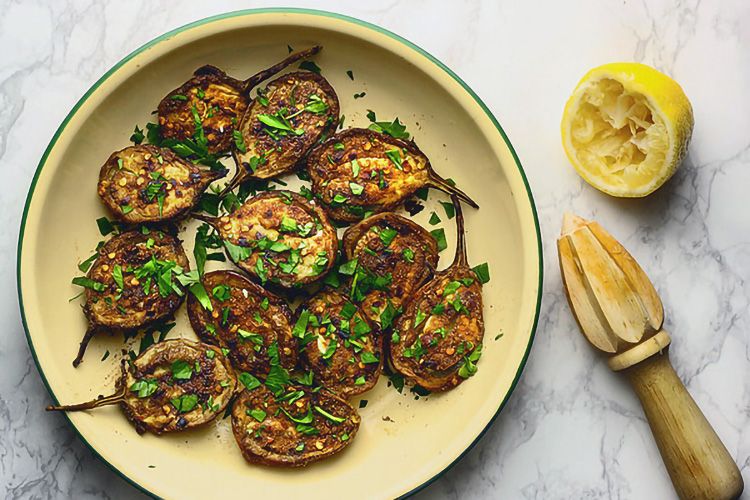
- Add eggplants, tomato, curry powder, eggplant, salt, and pepper powder and cook for about two minutes.
- Pour two cups of water and bring the mix to boil. Reduce the heat and simmer for 15 minutes.
- Add chickpeas to the mix and cook the mix for about five minutes.
- Switch off the flame, transfer the curry into a serving bowl, and add basil.
- Mash rice with a fork and serve it with the curry.
7. Eggplant lasagna
Image: Shutterstock
You will need:
- 2 eggplants (thinly sliced lengthwise)
- ½ pound tomatoes (halved and deseeded)
- ¼ cup parmesan cheese
- 1 cup Italian bread crumbs
- 1 large egg
- 1 tsp garlic (roughly chopped)
- 1/2 tsp kosher salt
- 1/4 tsp black pepper powder
- 4 tbsp virgin olive oil
How to:
- Preheat the oven at 190°C (375°F) and line a baking tray with a teaspoon of olive oil.

- Take a small mixing bowl, whisk the egg in it thoroughly, with some water, and keep it aside.
- Take another mixing bowl, add parmesan cheese, bread crumbs, salt, and black pepper in it and mix the ingredients well to prepare the coating mix.
- Make the top sauce by blending garlic, tomatoes, salt, and pepper.
- Dip eggplant slices into the egg, coat them with coating mixture, and place the slices on the baking tray.
- Pour the top sauce over the eggplant slices and bake for about 20 to 25 minutes or until the cheese starts melting, and the sauce begins to bubble.
- You can add different vegetables, like bell peppers, or which your baby can digest well to this recipe to up its nutritional value.
8. Grilled eggplant
Image: Shutterstock
You will need:
- 3 small eggplants (thinly sliced)
- 1 cup thick-sliced mild provolone
- ½tbsp balsamic vinegar
- ½tsp pepper powder
- ¼ tsp dried oregano
- ½tsp kosher salt
- 2 tbsp olive oil
How to:
- Mix olive oil, vinegar, and dried oregano in a mixing bowl and brush the mixture on both sides of the eggplant slices.
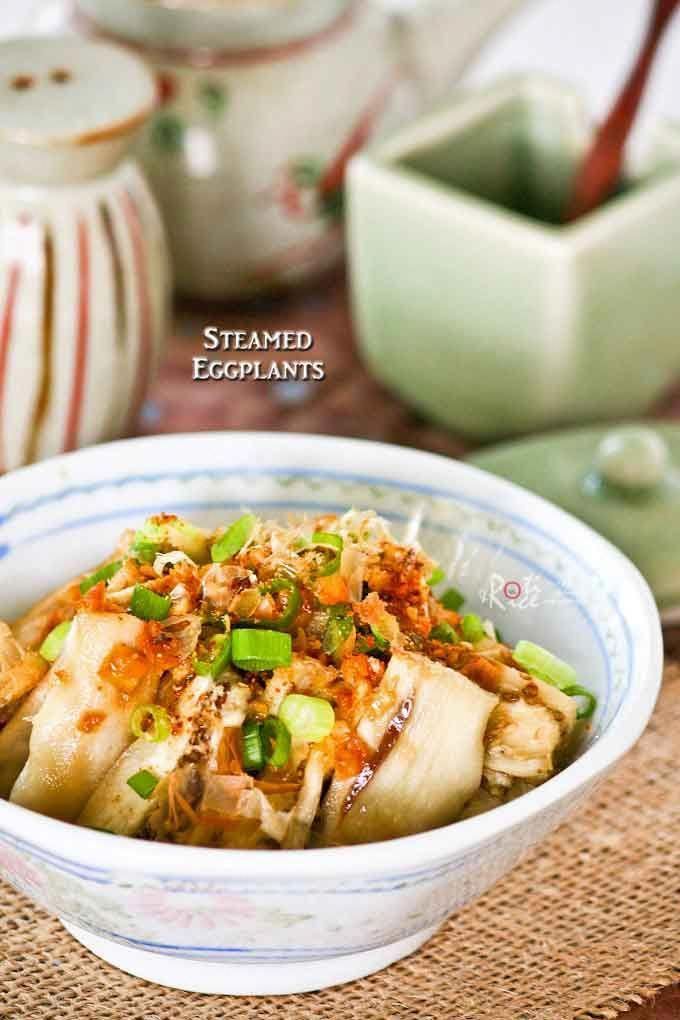
- Sprinkle salt and pepper on the eggplant slices and grill them until they turn brown from the side facing the grilling net’s heat.
- Flip every slice, top them with a slice of provolone, and grill for about three minutes or until the cheese starts to bubble.
- Serve immediately with homemade hummus sauce and grilled chicken/tofu/bread to make a complete meal.
9. Cheesy eggplant slices
Image: Shutterstock
You will need:
- 4 baby eggplant (fresh)
- ½tsp minced garlic
- 1 cup mozzarella cheese (shredded)
- 2 tbsp Italian cheese blend
- 1 tbsp parsley (chopped)
- 1 cup bread crumbs
- 1 tbsp dried oregano
- Salt and pepper to taste
How to:
- Cut the eggplant into halves, rub kosher salt onto each slice, and keep them aside for 15 minutes.
- Meanwhile, lightly roast the bread crumbs in a flat pan on medium to low flame.

- Mix bread crumbs, garlic, cheese, chopped parsley, salt, and pepper into a mixing bowl.
- Coat each eggplant slice with the mixture and keep them aside on a plate.
- Keep a large skillet on medium heat, add some oil, and put eggplant slices in it as the oil warms. You can even add spinach to enhance its nutritional value.
- After ten minutes, flip the side and sprinkle mozzarella cheese and dried oregano and cook until the cheese starts melting.
- Place the cheesy slices on a serving plate and serve warm with homemade mint dip, hummus, or tomato sauce.
10. Eggplant parmesan stick
Image: Shutterstock
You will need:
- 1 medium eggplant (peeled)
- ⅓ cup of all-purpose flour
- ¼ cup parmesan cheese (grated)
- ½ cup bread crumbs
- 2 large eggs (whisked)
- ½ teaspoon salt
- Olive oil cooking spray
How to:
- Cut the eggplant into two-inch-thick sticks and keep them aside.

- Mix the flour and salt in one bowl and bread crumbs and parmesan in another.
- Beat the eggs in the third bowl.
- Preheat the oven at 218°C (425°F).
- Lightly spray the baking tray with cooking oil spray.
- Dip the eggplant sticks first in the flour mixture, second egg, and third breadcrumbs.
- Place the sticks on the baking sheet and bake for 25-30 minutes or until the outside turns golden brown. This makes it crispy on the outside and creamy and tender inside.
- Serve warm with a bowl of vegetable or multi-beans.
1. Can eggplant cause diarrhea in babies?
Yes. Eggplant or aubergine is one of the most potent foods that can cause an allergy (11). Hence, if your baby is allergic to eggplants, it can cause allergic symptoms such as diarrhea (12).
2. Is my baby allergic to eggplant?
If you observe allergic symptoms such as rashes, vomiting, hives, swelling, and diarrhea after introducing eggplants to your baby’s diet, your baby could be allergic to this vegetable (12).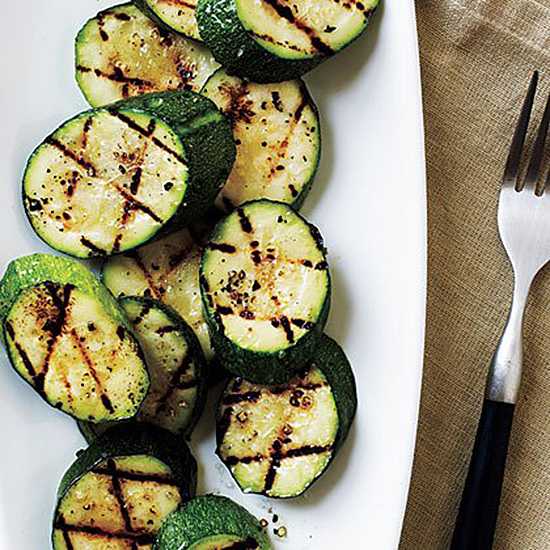
Eggplant is a nutritious vegetable that can be included in a baby’s diet. When introducing eggplant for babies, try the pureed version. Once they are comfortable with the blended form, you may feed it as finger food. Follow the three/five-day rule when introducing eggplant to babies for the first time to ensure they are not allergic to the vegetable. We have listed a few eggplant recipes for babies that you could try. You may also increase the nutritional profile of eggplants by including other vegetables. If you have any concerns regarding the feeding of eggplant to a baby, consult your pediatrician.
References:
1. Eggplant (Solanum Melongena); UIC Heritage Garden
2. Eggplant, cooked, boiled, drained, without salt, FDC ID: 169229; FoodData Central; USDA
3. Feeding and nutrition of infants and young children; WHO
4. Manganese; Oregon State University
5. Folate; Oregon State University
6.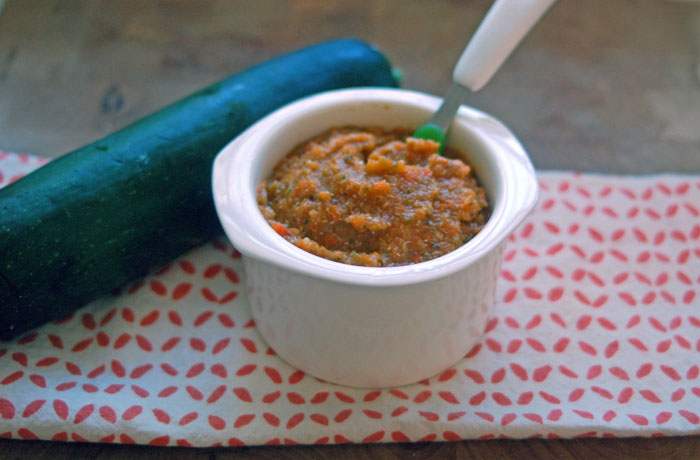 NergizGürbüzÇolak et al.; Health benefits and bioactive compounds of eggplant; Researchgate
NergizGürbüzÇolak et al.; Health benefits and bioactive compounds of eggplant; Researchgate
7. Muhammad YasirNaeem and SenayUgur Or Ozgen; Nutritional Content and Health Benefits of Eggplant; Researchgate
8. Y Noda et al.; Antioxidant activity of nasunin, an anthocyanin in eggplant peels; NCBI
9. Georgiana Horincar et al.; Value-Added Pastry Cream Enriched with Microencapsulated Bioactive Compounds from Eggplant (Solanummelongena L.) Peel; MDPI
10. Delayed Ripening Technology; International Service for the Acquisition of Agri-biotech Applications
11. Allergy to eggplant (Solanummelongena); Journal of Allergy and Clinical Immunology
12. Food Allergy; American College of Allergy, Asthma & Immunology
13. Mudnakudu N Kiran Kumar et al.; Higher histamine sensitivity in non-atopic subjects by skin prick test may result in misdiagnosis of eggplant allergy; NCBI
The following two tabs change content below.
- Reviewer
- Author
Can Durian Fruit Cure Infertility?
Can Durian Fruit Cure Infertility?
Potassium During Pregnancy: Is It Good Or Bad For You
Potassium During Pregnancy: Is It Good Or Bad For You
Mango For Babies: Nutritional Value, Benefits, And Recipes
Mango For Babies: Nutritional Value, Benefits, And Recipes
Can Babies Have Turmeric? Health Benefits And Precautions
Can Babies Have Turmeric? Health Benefits And Precautions
Eating Chocolate During Pregnancy: Is It Safe And How Much To Eat?
Eating Chocolate During Pregnancy: Is It Safe And How Much To Eat?
9 Simple Steps To Prepare Prune Puree For Your Baby
9 Simple Steps To Prepare Prune Puree For Your Baby
Is It Safe To Have Pomegranate & Pomegranate Juice During Pregnancy?
Is It Safe To Have Pomegranate & Pomegranate Juice During Pregnancy?
Ginger For Babies: When To Start, Benefits And Precautions
Ginger For Babies: When To Start, Benefits And Precautions
Spinach (Palak) During Pregnancy: Health Benefits And Possible Side Effects
Spinach (Palak) During Pregnancy: Health Benefits And Possible Side Effects
Eggplant in baby food
Feature : Eggplants can be introduced into the child's diet from 8 months as part of other dishes. As a separate dish - from 1.5 years.
As a separate dish - from 1.5 years.
Eggplant is a species of perennial herbaceous plants of the Solanum genus, a berry crop.
Eggplant came to us from the tropical regions of India. They appeared in Europe in the 16th century. Now it is used very widely. Eggplant consists of many useful substances: sugar, fiber, pectin, proteins, vitamins C, B1, B2, B5, PP, potassium, phosphorus, calcium, magnesium, iron, sodium, zinc, copper, manganese, cobalt. The shape of the eggplant is cylindrical or spherical. The color of the fruit can be different shades of purple, white, green. The length can be from 6 to 70 centimeters. nine0007
Read also : How to choose eggplants (video)
100 grams of eggplant contains 24 kcal
| Vitamins | Macronutrients | Microelements |
| Vitamin PP - 0. Beta-carotene - 0.02 mg Vitamin A (RE) - 3 mcg Vitamin B1 (thiamine) - 0.04 mg Vitamin B2 (Riboflavin) - 0.05mg Vitamin B6 (pyridoxine) - 0.2 mg Vitamin B9 (folic) - 18.5 mcg Vitamin C - 5mg nine0002 Vitamin E (TE) - 0.1 mgVitamin PP (niacin equivalent) - 0.8 mg | Calcium - 15 mg Magnesium - 9 mg Sodium - 6 mg Potassium - 238 mg Phosphorus - 34 mg Chlorine - 47 mg Sulfur - 15 mg nine0028 | Iron - 0.4 mg Zinc - 0.29 mg Iodine - 2 mcg Copper - 135 mcg Manganese - 0.21 mg Fluorine - 14 mcg Molybdenum - 10 mcg Boron - 100 mcg Cobalt - 1 mcg Aluminum - 815 mcg |
Composition and nutritional properties of eggplant
100 g eggplant contains:
- Proteins - 2 g
- Fats - 0.
 1 g
1 g - Carbohydrates - 4.5 g
- Dietary fiber - 2.5 g
- Organic acids - 0.2 g
- Water - 91 g
- Mono- and disaccharides - 3.6 g
- Starch - 0.9 g
- Ash - 0.5 g
Useful properties of eggplant
It is claimed that eggplant helps to get rid of nicotine addiction and has a beneficial effect on the process of losing weight. Eggplants also contribute to the removal of excess fluid and toxins from the body. Eggplant can be used to prevent atherosclerosis, cardiovascular diseases. It has a beneficial effect on the process of hematopoiesis, increases hemoglobin in the blood, promotes the formation of red blood cells, normalizes the liver, promotes the excretion of cholesterol, stimulates the intestines, and lowers blood sugar levels. nine0007
Read also: Useful product. Eggplant
Contraindications for use
Do not eat overripe eggplant.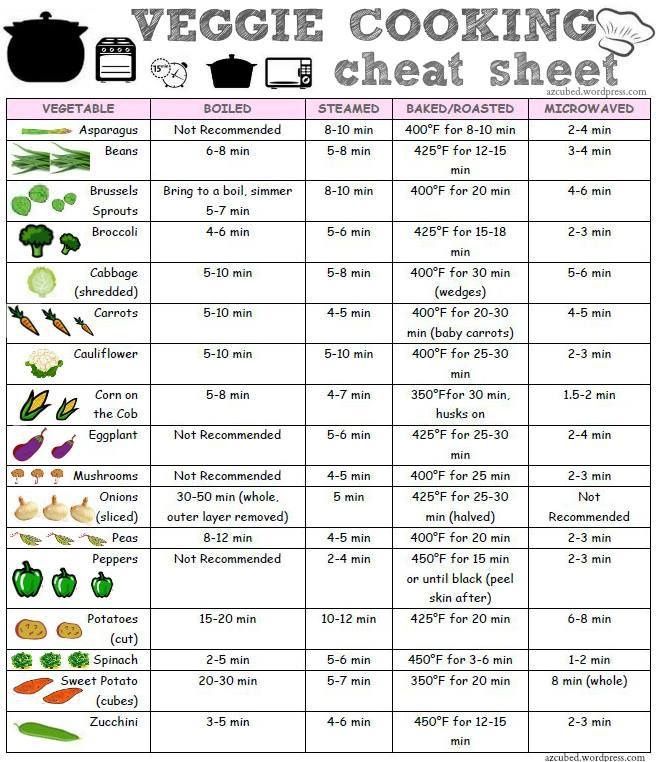 This may cause poisoning.
This may cause poisoning.
Eggplant in children's diet
Eggplant must be present in the children's diet. It is very useful and rich in all the vitamins necessary for the child. But remember that the child needs to be given young fruits. nine0007
Preparation and consistency
Eggplant can be used in a children's diet from eight months as part of cereals or mashed potatoes. As an independent product, experts recommend using from 1.5-2 years.
Eggplant Recipes for Children
Eggplant rolls
Ingredients:
- Eggplant - 2 pcs.
- Minced meat - 200 g
- Rice boiled - 3 tbsp. spoons
- Garlic - 1 clove
- Grated cheese - 3 tbsp. spoons
- Tomato sauce
- Pepper, salt
Preparation:
First you need to thinly cut the eggplant lengthwise, boil in boiling water for two minutes, then cook in a double boiler for 5-10 minutes. Add boiled rice, cheese and chopped garlic to minced meat. All this salt and mix. Then you need to put the filling on each slice of eggplant and roll it up. Put them in a baking dish or in a steamer container. Top with tomato juice. Bake in the oven for about 30 minutes, cook in a double boiler for 40 minutes.
Add boiled rice, cheese and chopped garlic to minced meat. All this salt and mix. Then you need to put the filling on each slice of eggplant and roll it up. Put them in a baking dish or in a steamer container. Top with tomato juice. Bake in the oven for about 30 minutes, cook in a double boiler for 40 minutes.
Read also: 3 eggplant recipes
Vegetable stew with eggplant
Ingredients:
- Eggplant - 1 pc.
- Potatoes - 2-3 pcs.
- Tomato - 2-3 pcs.
- Sweet pepper - 2 pcs.
- Onion - 1 pc.
- Garlic - 2 cloves nine0119 Tomato sauce - 4 tbsp. spoons
Preparation:
First you need to peel the potatoes and cut them into strips. Then take the tomatoes and cut into slices, cut the pepper and eggplant into half rings. Garlic and onion should be cut very finely. Put potatoes, peppers, eggplants, onions, garlic, tomatoes in a double boiler, pour tomato juice on top. Preparing 30 minutes.
Preparing 30 minutes.
Eggplant stuffed with vegetables
Ingredients:
- Eggplant - 1 kg
- White cabbage - 150 g
- Carrots - 55-60 g
- Tomato - 2-3 pcs.
- Green peas - 75 g
- Greenery
Preparation:
First you need to cut the cabbage, grate the carrots on a coarse grater and mix. Then you need to boil the green peas in salted water until tender, cut the greens. Add peas and greens to cabbage and mix. Dice the tomatoes and mix again. Cut the eggplant in half lengthwise and carefully cut out the flesh with a knife. Put the vegetables in the eggplant halves and place them in a steamer or oven dish. Eggplants are cooked for 30 minutes in a double boiler and 20-25 minutes in the oven. nine0007
Bon appetit!
Read more recipes in the Baby food section
Read about when to introduce new foods into the baby’s diet, about the beneficial properties of these foods and how to diversify the baby’s menu with new dishes in the Encyclopedia of Baby Food
Eggplants, or, as people call them, “blue ones”, are firmly entrenched in our diet. But many mothers still doubt the benefits of this vegetable for their baby and ask: “Is it good for the child, does it cause allergies in children, at what age can it be given?”. Answers to these questions are important for young parents, so we will try to answer them in full.
Photo: Depositphotos.com. Author: Tverdohlib.com.
Contents
- If a child has tummy problems, eggplant puree can solve them.
- Hemoglobin often decreases in children under five years of age. To normalize it, you can offer your child stewed or baked vegetables.
- Eggplants are rich in phytonutrients - natural antioxidants that protect the child's body from serious diseases, including cancer.
- A source of B vitamins, although it loses to avocados and sweet potatoes, it remains a good option for enriching a child's menu with thiamine, niacin, folic and pantothenic acids.
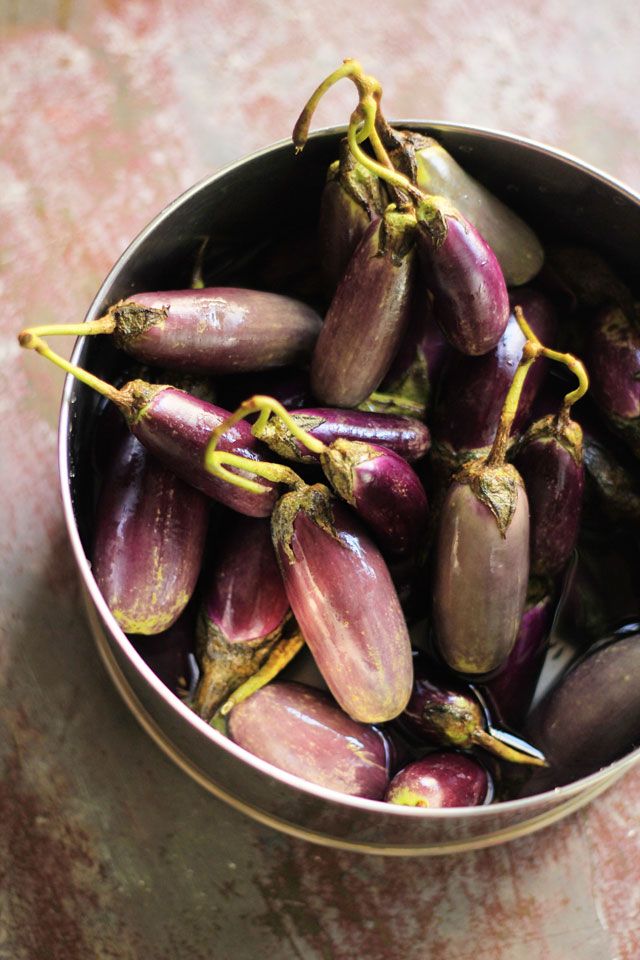 These nutrients are involved in brain development, strengthening the nervous system and many metabolic processes of a growing body. nineMCG
These nutrients are involved in brain development, strengthening the nervous system and many metabolic processes of a growing body. nineMCG Tiamine 0.1 mg Pantotenic acid 0.1 mg Vitamin B6 0.021 0.021 0.021 0.0021 Mg Kholin Kholin Kholin KholinMinerals potassium 122 mg sodium 237 mg calcium 5.9 mg phosphorus 14.8 mg 900 Magnesium 10.9 mg Iron 0.2 mg Contains trace amounts of selenium, copper, manganese and zinc. But in addition to the listed useful properties, eggplant has its drawbacks. The composition of the product includes solanine, which can harm the health of the child: cause allergies, indigestion and even poisoning.
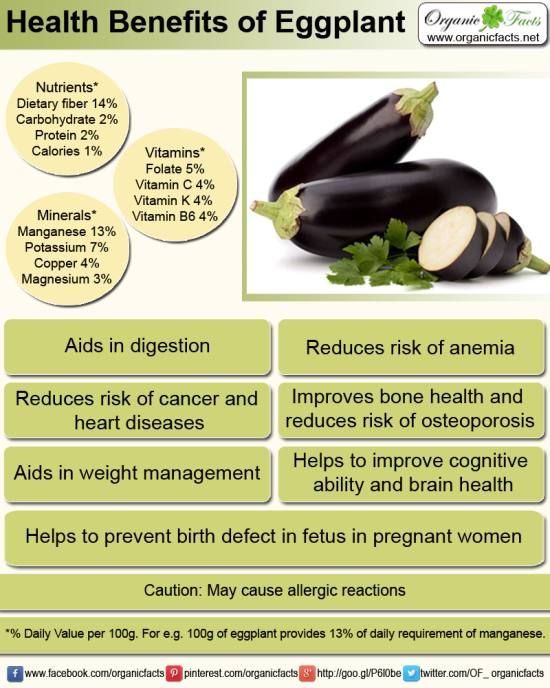
Why raw potatoes are good for children.
At what age to give
So, when can you introduce your child to a new vegetable? Pediatricians recommend gradually introducing eggplant into complementary foods for babies, starting from 8-10 months, as part of vegetable soups or mashed potatoes. By one and a half years, you can give the fruits themselves.
The peculiarity of eggplant is that it should not be eaten raw, but before cooking it must be scalded with boiling water or kept salted on a flat dish for 40 minutes in order for the bitterness to disappear.
By introducing new foods to complementary foods, we gradually accustom them to new taste sensations. Surely the taste of this vegetable will appeal to little gourmets. nine0007
However, when preparing eggplant for a child, you should avoid long-term frying or deep-frying. It is recommended that the fruits be baked, stewed or made into a gentle puree.
Eggplant intended for baby food should be cleaned and only the pulp should be used - it is more tender in taste and easier to digest.
 A baby can choke on hard skin.
A baby can choke on hard skin. Harm for the child
When deciding at what age to start giving eggplant to the baby, mothers need to get the opinion of a practicing pediatrician. Some doctors believe that a child under three years of age should not eat these vegetables, because they contain solanine, a lot of heavy fiber and few calories. This is especially true for children with disorders in the digestive tract. nine0007
In other words, "blue" is ideal for low-calorie diets, but not quite suitable for a child who needs calories to replenish energy stores and actively grow.
To get rid of solanine, the fruits are soaked for a long time, but some of it may remain and cause poisoning or an allergic reaction in the crumbs.
Allergies
Eggplant can be classified as a food that can cause severe allergic reactions in children due to the huge amount of minerals they contain. Any component can become an allergen, even vitamin C, which is useful and necessary for a person.
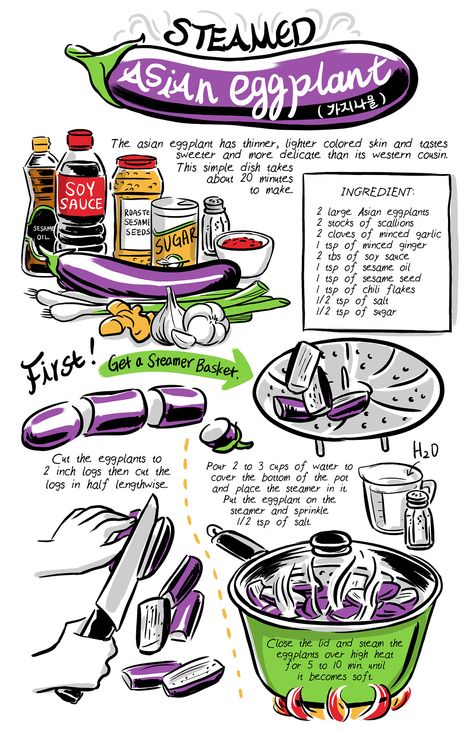 The main reasons are: weakened immunity of the baby or hereditary predisposition. nine0007
The main reasons are: weakened immunity of the baby or hereditary predisposition. nine0007 When giving a child previously unfamiliar foods, you should carefully monitor the state of his gastrointestinal tract, stool consistency and skin rashes.
The first symptoms of all types of allergies are the same:
- nausea, vomiting, diarrhea;
- skin redness, itching;
- lacrimation, cough, runny nose;
- chills and fever.
Seek immediate medical attention if these symptoms occur. Having found an allergic reaction to eggplant, you should exclude them from the children's diet, consult an allergist and do tests for possible allergens. nine0007
Sometimes overuse of the product also causes a reaction. In this case, expert advice is also needed. It is possible that a small amount of healthy vegetables will not harm the health of the child.
In any case, you can not joke with allergies, as it can lead to anaphylactic shock and death.
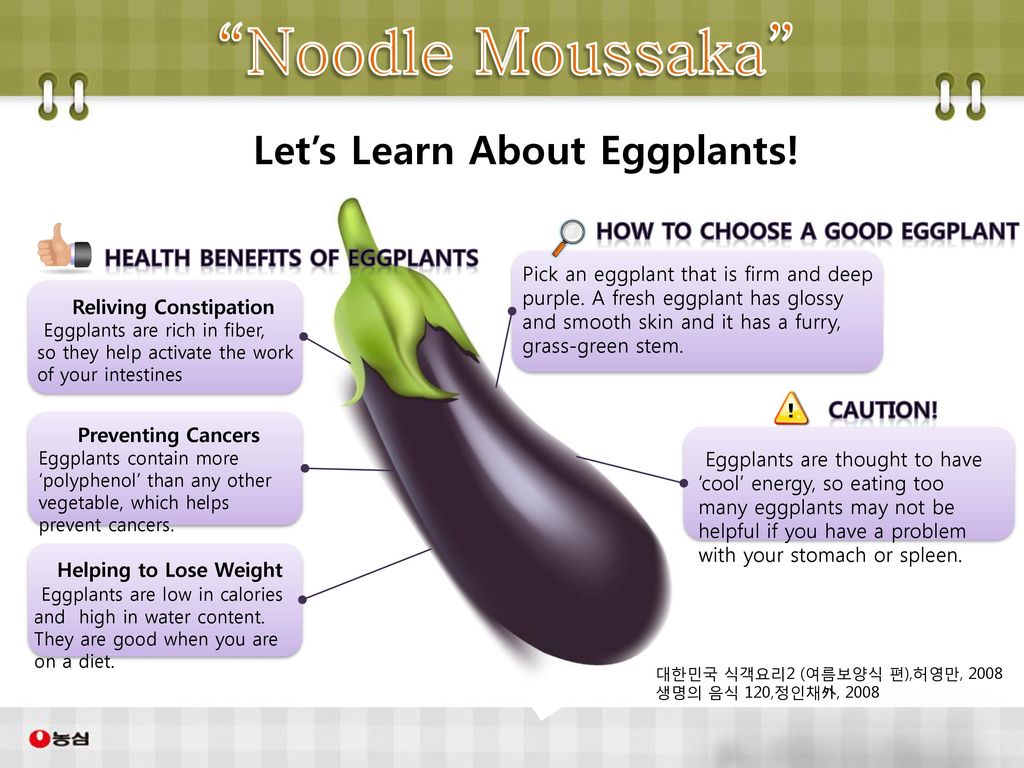
How to choose
This vegetable may be present in the diet of children. But it is better to introduce young, slightly unripe eggplants into complementary foods. Overripe and spoiled fruits can cause poisoning due to high doses of solanine. The older and larger the specimens, the more of this substance they contain. In addition, young eggplants have smaller and more tender seeds - it will be easier for a child to handle them. nine0007
Choose vegetables that are medium in size and have shiny, undamaged skins. When cutting an eggplant, pay attention to the color of the pulp and seeds: the flesh should be white or yellowish, and the seeds should be slightly darker than the pulp without an unpleasant odor. If the flesh is green, and the seeds are dark or darken quickly in the air, this is a sign of staleness and the beginning of decay processes. It is better to get rid of such vegetables immediately.
How to cook
Cooking eggplant for your baby is easy.
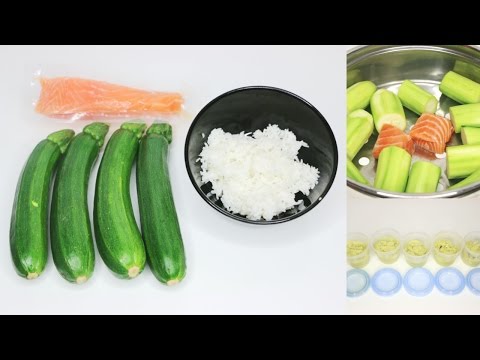 It is much more difficult to make your capricious love a new vegetable. That's why you don't need to limit your culinary fantasy to single-component purees. Adding other healthy ingredients will enrich the dish with nutrients, as well as new shades of taste and aroma. nine0007
It is much more difficult to make your capricious love a new vegetable. That's why you don't need to limit your culinary fantasy to single-component purees. Adding other healthy ingredients will enrich the dish with nutrients, as well as new shades of taste and aroma. nine0007 Due to the similarity in texture, eggplant goes well with white zucchini and zucchini. But that's not all, for example:
- green beans;
- pumpkin;
- cheese;
- brown rice;
- lentils;
- pasta.
Any of the listed products is appropriate in the children's diet, provided that the baby had time to try it earlier.
When preparing eggplants, remember that children under one and a half years old should not be given food that has been stored in the refrigerator for more than 12 hours. nine0007
How to cook sweet potato for a child.
Vegetable stew
- Use your child's favorite vegetables to prepare the stew. In addition to eggplant, these are usually potatoes, zucchini, tomatoes, onions, cabbage and carrots.

- Peel them and cut into thin strips.
- Stir and place in a pot with a little water.
- Simmer over low heat with vegetable oil for at least 40 minutes.
- Try not to add salt to your baby's food or use a minimum amount of salt without adding spices. If desired, the dish can be sprinkled with dill or other herbs. nine0120
Steamer with cheese
- For this dish you will need two young eggplants and two tomatoes, 20-30 g of hard cheese.
- Peel the vegetables and cut into circles, put the tomato slices on the eggplant slices, sprinkle with grated cheese on top.
- Place the cooked food in the steamer and set the timer for 30 minutes.
This dish is not only tasty, but also very healthy, because it retains the maximum of vitamins and minerals from raw vegetables. nine0007
With minced meat
The dish can be cooked in the oven, in the steamer or in the slow cooker.
- Take three young fruits, peel them, cut them in half and carefully scoop out the core with a spoon.
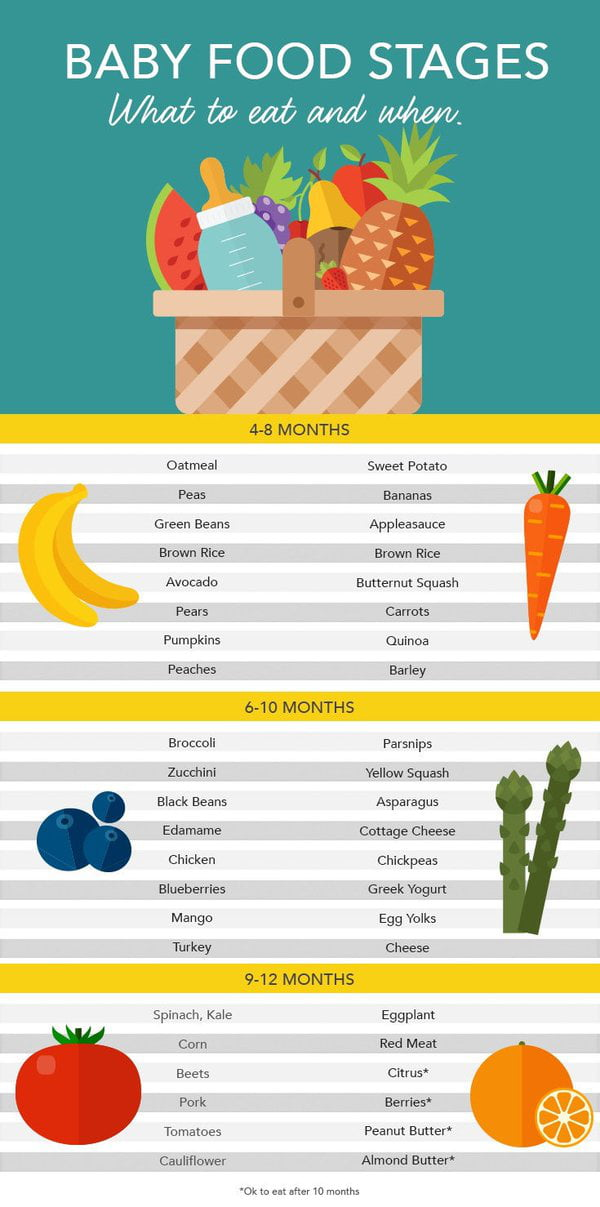
- Mix the pulp with minced meat, onion, add the egg.
- Refill the eggplant halves with the stuffing.
- Sprinkle generously with grated cheese.
- Bake for at least 30 minutes.
Gentle puree soup
Puree soup is prepared from both fresh and frozen vegetables.
- You will need: one eggplant, a small zucchini, a few potatoes, 2-3 ripe tomatoes, onions, a little 15% cream.
- Peel and dice all vegetables.
- Pour potatoes into boiling water, 10 minutes after boiling - eggplant and zucchini, after another 5 minutes - finely chopped tomatoes and onions.
- After the last boil, remove the dish from the heat and beat the contents with a blender. nine0120
- Add the cream, salt to taste and let the soup boil again.
This tender and very healthy soup can be eaten with homemade croutons. It will appeal not only to the child, but also to the parents.
Puree
- Medium-sized young fruits with shiny skin are suitable for pureeing.
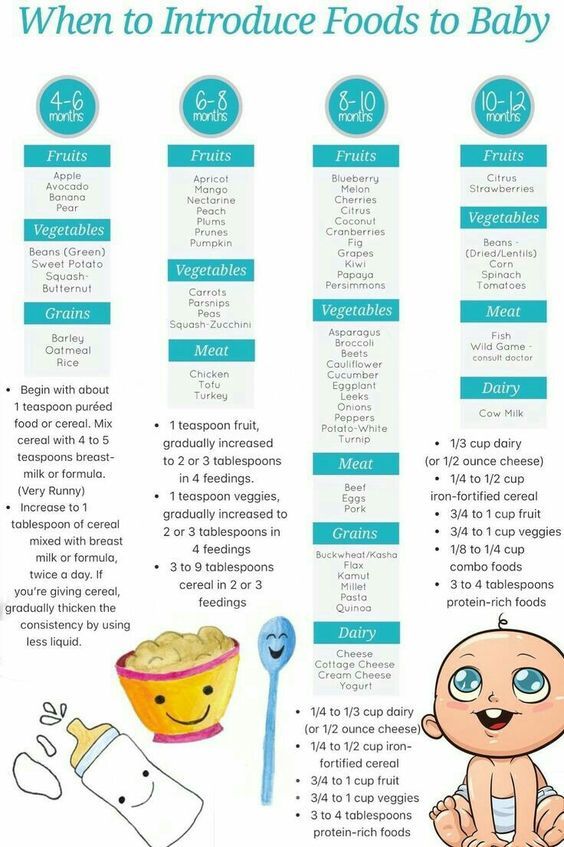 Cut them in half, make shallow cuts along the entire length and season with salt. Leave for 40 minutes to get rid of bitterness.
Cut them in half, make shallow cuts along the entire length and season with salt. Leave for 40 minutes to get rid of bitterness. - Bake the eggplant halves in the oven for 30 minutes. nine0120
- Scoop out the pulp from the baked fruits with a spoon, mix with finely chopped browned onions, mix well.
- Simmer for a further 20 minutes. For a thinner consistency, you can use a blender at the final stage of cooking.
Delicious eggplant puree is ready. It is combined with mashed potatoes, any vegetable salad and steam cutlets.
Eggplant or zucchini
Pediatricians have different opinions on the question of how many months / years to introduce eggplant into the children's menu. Some consider the age of 8 months to be quite acceptable. Someone allows not earlier than a year and a half. Others insist on age limits of up to three years. nine0007
Zucchini does not cause allergic reactions and is well absorbed by the child's body. Doctors even advise introducing zucchini into artificial foods starting at 4 months, and breastfed babies from 6 months.
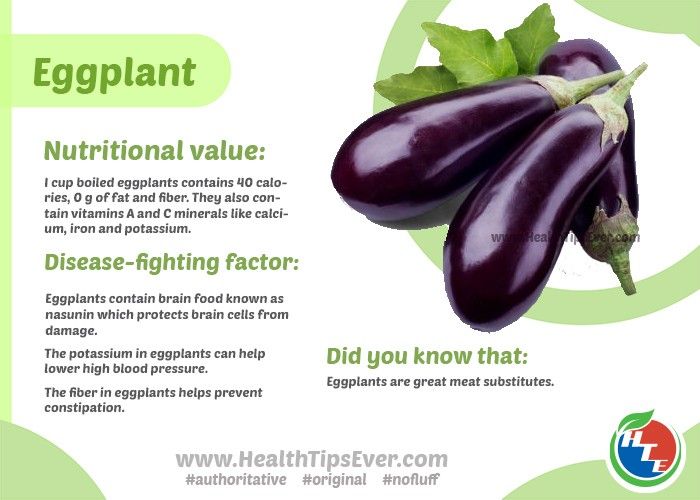

 6 mg
6 mg 

